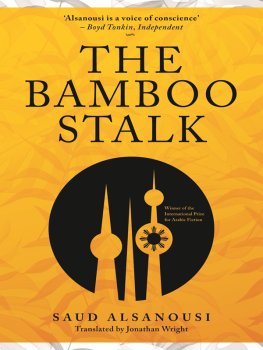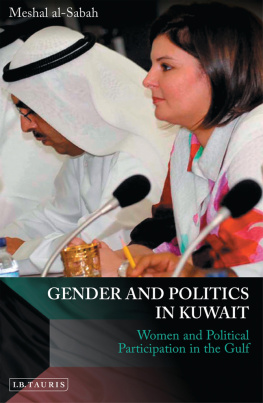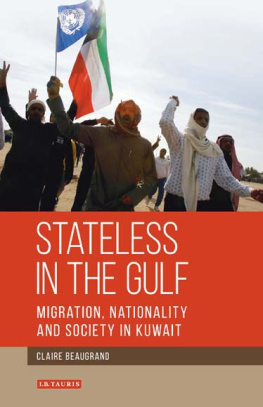Saud Alsanousi
The Bamboo Stalk
Dedicated to crazies who are not like other crazies, crazies who resemble only themselves. . Mishaal, Turki, Jabir, Abdullah and Mahdi. To them and only them.
PART 1. Isa. . Before He Was Born
There are no tyrants where there are no slaves.
Jos Rizal
1
My name is Jos. In the Philippines its pronounced the English way, with an h sound at the start. In Arabic, rather like in Spanish, it begins with a kh sound. In Portuguese, though its written the same way, it opens with a j, as in Joseph. All these versions are completely different from my name here in Kuwait, where Im known as Isa.
How did that come about? I didnt chose my name so I wouldnt know. All I know is that the whole world has agreed to disagree about it.
When I was growing up in the Philippines, my mother didnt want to call me by the name my father chose when I was born. Although its the Arabic equivalent of Jesus and shes a Christian, its still an Arabic name and isa is the Filipino word for the number one. I suppose it would sound funny if people called me a number instead of a name.
My mother called me Jos after the Philippine national hero Jos Rizal, who was a doctor and writer in the nineteenth century. Without Rizal the people wouldnt have risen up to throw out the Spanish occupiers, but the uprising had to wait till after he was executed.
Jos or Isa, whatever. Theres no great need to talk about my problem with names or how I acquired them, because my problem isnt really with names but with what lies behind them.
When I was growing up in the Philippines, the neighbours and others who knew me didnt call me by either of my real names. They had never heard of a country called Kuwait, so they just called me the Arab. In fact I dont look anything like an Arab, except that my moustache and beard do grow fast. The image common in the Philippines is that Arabs are hairy, and cruel as well, and the stereotype usually includes a beard of some shape or length.
In Kuwait, on the other hand, the first thing I lost was my nickname the Arab, along with my other names and titles, though I later acquired a new nickname: the Filipino.
If only I could have been the Filipino in the Philippines, or the Arab in Kuwait! If only the word if could change things, or if. . but theres no need to go into that now.
I wasnt the only person in the Philippines born to a Kuwaiti father. Plenty of Filipina women have had children by Kuwaiti men, or other Gulf men, and even other Arabs. The women worked as maids in houses in the Arab world or messed around with tourists from Arab countries who came seeking pleasure at a price that only someone in dire need would accept. Some people engage in vice to satisfy their natural urges; others, due to poverty, engage in vice to fill their stomachs. In many cases the outcome is fatherless children.
Many young women in the Philippines are treated like paper handkerchiefs. Strange men blow their noses on them, throw them on the ground and walk away. Those handkerchiefs then give rise to creatures whose fathers are unknown. Sometimes we can tell who the fathers are by the appearance of their children, and some of the children have no qualms about admitting they dont know who their fathers are. But I had something that set me apart from those whose fathers were unknown: my father had promised my mother that he would take me back to where I was meant to be, to the country that had produced him and to which he belonged, so that I too could belong, and live as all those who shared his nationality lived, in comfort and peace for the rest of my days.
2
My mother, Josephine, went to work in Kuwait in the mid-1980s, in the home of the woman who would later become my grandmother. She abandoned her education and left her family behind. The family was in desperate straits and her father, her sister who had just become a mother, her brother and his wife and their three children were all pinning their hopes on my mother to provide for them. They wanted a life, not necessarily a decent life, but a life.
I never imagined I would work as a housemaid, my mother would say. She was a girl with dreams. She had ambitions to complete her education and get a respectable job. She wasnt at all like the rest of her family. While her sister dreamed about buying shoes or a new dress, my mother dreamed about getting hold of books, either by buying them or borrowing them from one of her classmates at school. I read lots of stories, fantasies and ones about real life. I loved Cinderella and Cosette, the heroine of Les Misrables, and I ended up a maid like them but, unlike them, my story didnt have a happy ending, she said.
Circumstances drove my mother to leave her country and family and friends to work abroad. Although it was hard for a woman of twenty, she had a much better life than her sister, Aida, who was three years older. Aida went out to work early because the family was hungry, their mother was ill and their father was a gambler who wasted his money and ran up debts breeding cocks for fighting. So the parents saw no alternative but to offer their elder daughter, who was seventeen at the time, to an agent who found her work in the local nightclubs and bars and who insisted on his share of the girls body and earnings at the end of every working day.
Everything happens for a reason, and for a purpose, my mother always said, and whenever I looked for a reason for everything that happened, it was always poverty that raised its ugly head.
The further Aida progressed at work, the deeper she sank into the abyss. She started serving in a bar, prey to the eyes and lewd remarks of drunken men, then in a nightclub, where she was jostled by sweaty bodies and groped by stray hands, and then as a dancer in a strip joint, ogled by hungry eyes. So it continued until she reached the highest rank, and the lowest, in the world of night life.
Will they go to hell? I asked my mother one day, referring to the prostitutes who came out on the streets as soon as the sun went down, like the crabs that scamper along the sandy beach as soon as the tide goes out. When the sun rises again, the beams of light wash away the sins of the night, and when the tide comes in again it sweeps away the crabs, filling in the holes they have dug in the sand in the waters absence. I dont know, but they certainly lead men to hell, my mother replied without conviction.
For a time young Aida offered her body to anyone who asked, at a price set by her agent. The price for foreign men was higher than the rate that local men with little money were asked to pay. The price varied according to the time and place. There was a price for the hour and a price for the whole night, a price for services provided in the back rooms at the club and another price for services offered in hotel rooms.
Aida become an object, like anything bought or sold at a price. The price was usually a pittance, rarely prohibitive. The price depended on the kind of service she offered. She worked in silence and in sadness, and grew to hate men and their money. What hurts is not that someone comes cheap. What really hurts is that someone should have a price in the first place.
Aida became the family breadwinner. She would come home towards dawn, clutching her little handbag. Her sick mother and her gambler father awaited the contents of the bag with impatience. Sometimes she would come home late and my mother would worry about her elder sister, while the parents saw her lateness as a good omen because it probably meant she had spent the whole night with one of her clients in some hotel. In that case she would fetch a good price, because obviously the man in the hotel would be a foreigner, who would make a larger contribution to the contents of her handbag. Sometimes she would come home with a swollen lip, a bloodied nose or a dark blue bruise on her jaw. Her parents didnt even notice. The only thing that interested them about the brute who had hurt their daughter was the money he tossed at her after sating his lust.











